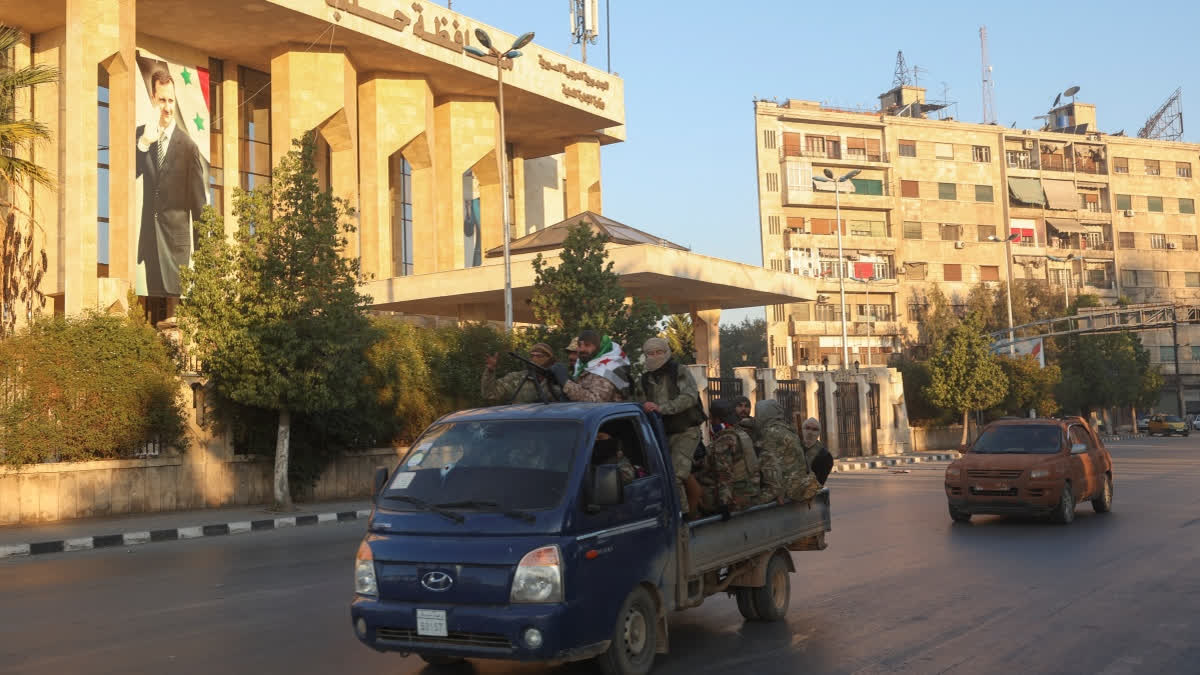Beirut:Thousands of Syrian insurgents took over most of Aleppo on Saturday, establishing positions in the country's largest city and controlling its airport before expanding their shock offensive to a nearby province. They faced little to no resistance from government troops, according to fighters and activists.
A war monitor, the Syrian Observatory for Human Rights, said the insurgents led by Hayat Tahrir al-Sham seized control of Aleppo International Airport, the first international airport to be controlled by insurgents. The fighters claimed they seized the airport and posted pictures from there.
Thousands of fighters also moved on, facing almost no opposition from government forces, to seize towns and villages in northern Hama, a province where they had a presence before being expelled by government troops in 2016. They claimed Saturday evening to have entered the city of Hama.
A huge embarrassment for Assad
The swift and surprise offensive is a huge embarrassment for Syria's President Bashar Assad and raises questions about his armed forces' preparedness. The insurgent offensive launched from their stronghold in the country's northwest appeared to have been planned for years. It also comes at a time when Assad's allies were preoccupied with their own conflicts.
In his first public comments since the start of the offensive, released by the state news agency Saturday evening, Assad said Syria will continue to "defend its stability and territorial integrity against terrorists and their supporters." He added that Syria is able to defeat them no matter how much their attacks intensify.
Turkey, a main backer of Syrian opposition groups, said its diplomatic efforts had failed to stop government attacks on opposition-held areas in recent weeks, which were in violation of a de-escalation agreement sponsored by Russia, Iran and Ankara. Turkish security officials said a limited offensive by the rebels was planned to stop government attacks and allow civilians to return, but the offensive expanded as Syrian government forces began to retreat from their positions.
The insurgents, led by the Salafi jihadi group Hayat Tahrir al-Sham and including Turkey-backed fighters, launched their shock offensive on Wednesday. They first staged a two-pronged attack in Aleppo and the Idlib countryside, entering Aleppo two days later and securing a strategic town that lies on the highway that links Syria's largest city to the capital and the coast.
By Saturday evening, they seized at least four towns in the central Hama province and claimed to have entered the provincial capital. The insurgents staged an attempt to reclaim areas they controlled in Hama in 2017 but failed.
Preparing a counterattack
Syria's armed forces said in a statement Saturday that to absorb the large attack on Aleppo and save lives, it redeployed troops and equipment and was preparing a counterattack. The statement acknowledged that insurgents entered large parts of the city but said they have not established bases or checkpoints. Later on Saturday, the armed forces sought to dispel what it said were lies in reference to reports about its forces retreating or defecting, saying the general command was carrying out its duties in "combatting terrorist organizations."
The return of the insurgents to Aleppo was their first since 2016, following a grueling military campaign in which Assad's forces were backed by Russia, Iran and its allied groups.
The 2016 battle for Aleppo was a turning point in the war between Syrian government forces and rebel fighters after 2011 protests against Assad's rule turned into an all-out war. After appearing to be losing control of the country to the rebels, the Aleppo battle secured Assad's hold on strategic areas of Syria, with opposition factions and their foreign backers controlling areas on the periphery.
The lightning offensive threatened to reignite the country's civil war, which had been largely in a stalemate for years.
Late on Friday, witnesses said two airstrikes hit the edge of Aleppo city, targeting insurgent reinforcements and falling near residential areas. The Observatory said 20 fighters were killed.
Insurgents were filmed outside police headquarters, in the city center, and outside the Aleppo citadel, the medieval palace in the old city center, and one of the largest in the world. They tore down posters of Assad, stepping on some and burning others.
The push into Aleppo followed weeks of simmering low-level violence, including government attacks on opposition-held areas.
The offensive came as Iran-linked groups, primarily Lebanon's Hezbollah, which has backed Syrian government forces since 2015, have been preoccupied with their own battles at home. A ceasefire in Hezbollah's two-month war with Israel took effect Wednesday, the same day that Syrian opposition factions announced their offensive. Israel has also escalated its attacks against Hezbollah and Iran-linked targets in Syria during the last 70 days.
